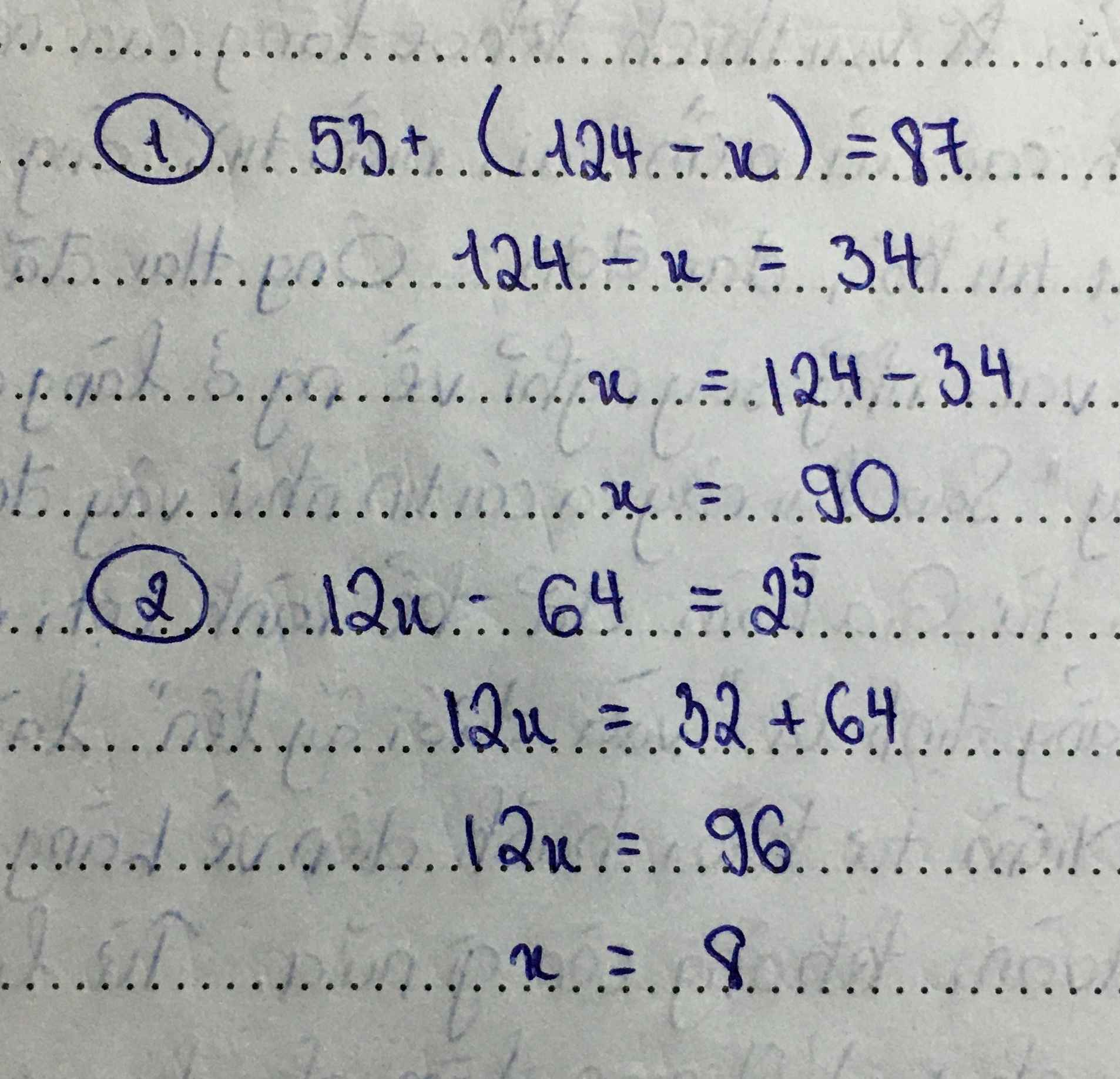
Hãy nhập câu hỏi của bạn vào đây, nếu là tài khoản VIP, bạn sẽ được ưu tiên trả lời.


\(1,\Rightarrow4^{x+1}=4^{3x}\\ \Rightarrow x+1=3x\\ \Rightarrow2x=1\\ \Rightarrow x=\dfrac{1}{2}\\ 2,\Rightarrow5x-2x=10+10x\\ \Rightarrow7x=-10\\ \Rightarrow x=-\dfrac{10}{7}\)


`a,`\(2^x -15= 2^4+1\)
`-> 2^x-15=17`
`-> 2^x=17+15`
`-> 2^x=32`
`-> 2^x=2^5`
`-> x=5`
`b,` Có phải đề là \(\dfrac{x+1}{65}+\dfrac{x+2}{64}=\dfrac{x+3}{63}+\dfrac{x+4}{62}\) ?
`=>`\(\dfrac{x+1}{65}+1+\dfrac{x+2}{64}+1=\dfrac{x+3}{63}+1+\dfrac{x+4}{62}+1\)
`=>`\(\dfrac{x+1+65}{65}+\dfrac{x+2+64}{64}-\dfrac{x+3+63}{63}-\dfrac{x+4+62}{62}=0\)
`=>`\(\dfrac{x+66}{65}+\dfrac{x+66}{64}-\dfrac{x+66}{63}-\dfrac{x+66}{62}=0\)
`=>`\(\left(x+66\right)\left(\dfrac{1}{65}+\dfrac{1}{64}-\dfrac{1}{63}-\dfrac{1}{62}\right)=0\)
Mà `1/65+1/64-1/63-1/62 \ne 0`
`-> x+66=0`
`-> x=-66`

a: =>2^x=2^4+16=32
=>x=5
b: Sửa đề: \(\dfrac{x+1}{65}+\dfrac{x+2}{64}=\dfrac{x+3}{63}+\dfrac{x+4}{62}\)
=>\(\left(\dfrac{x+1}{65}+1\right)+\left(\dfrac{x+2}{64}+1\right)=\left(\dfrac{x+3}{63}+1\right)+\left(\dfrac{x+4}{62}+1\right)\)
=>x+66=0
=>x=-66

53 + (124 - x) = 87
(124 - x) = 87 - 53
(124 - x) = 34
x = 124 - 34
x = 90
12.x - 64 = 25
12.x - 64 = 32
12.x = 32 + 64
12.x = 96
x = 96 : 12
x = 8

a) Ta có: \(\left(x-1\right)^{x+2}-\left(x-1\right)^{x+4}=0\)
\(\Leftrightarrow\left(x-1\right)^x\cdot\left(x-1\right)^2-\left(x-1\right)^x\cdot\left(x-1\right)^4=0\)
\(\Leftrightarrow\left(x-1\right)^{x+2}\cdot\left[1-\left(x-1\right)^2\right]=0\)
\(\Leftrightarrow\left[{}\begin{matrix}x-1=0\\x-1=1\\x-1=-1\end{matrix}\right.\Leftrightarrow\left[{}\begin{matrix}x=1\\x=2\\x=0\end{matrix}\right.\)
b) Ta có: \(\dfrac{1}{4}\cdot\dfrac{2}{6}\cdot\dfrac{3}{8}\cdot\dfrac{4}{10}\cdot\dfrac{5}{15}\cdot...\cdot\dfrac{30}{62}\cdot\dfrac{31}{64}=2x\)
\(\Leftrightarrow2x=\dfrac{1}{64}\)
hay \(x=\dfrac{1}{128}\)

1/
$(x-1)^{x+10}=(x-1)^{x+8}$
$\Rightarrow (x-1)^{x+10}-(x-1)^{x+8}=0$
$\Rightarrow (x-1)^{x+8}(x^2-1)=0$
$\Rightarrow (x-1)^{x+8}=0$ hoặc $x^2-1=0$
Nếu $(x-1)^{x+8}=0\Rightarrow x-1=0\Rightarrow x=1$
Nếu $x^2-1=0\Rightarrow x^2=1=1^2=(-1)^2\Rightarrow x=1$ hoặc $x=-1$
Vậy $x=1$ hoặc $x=-1$
2/
$1^3+2^3+3^3+...+10^3=(x+1)^2$
Ta có công thức quen thuộc:
$1^3+2^3+...+n^3=(1+2+...+n)^2=\frac{[n(n+1)]^2}{4}$
Bạn có thể xem cm tại đây:
https://diendantoanhoc.org/topic/81694-t%C3%ADnh-t%E1%BB%95ng-s-13-23-33-n3/
Khi đó:
$1^3+2^3+...+10^3=(x+1)^2$
$\Rightarrow \frac{[10(10+1)]^2}{4}=(x+1)^2$
$\Rightarrow 3025=(x+1)^2$
$\Rightarrow x+1=55$ hoặc $x+1=-55$
$\Rightarrow x=54$ hoặc $x=-56$

a, ĐKXĐ:\(x\ge1\)
\(\sqrt{x-1}=3\\ \Rightarrow x-1=9\\ \Rightarrow x=10\)
\(b,x^2-64=0\\ \Rightarrow\left(x-8\right)\left(x+8\right)=0\\ \Rightarrow\left[{}\begin{matrix}x=8\\x=-8\end{matrix}\right.\\ c,x^2+16=25\\ \Rightarrow x^2=9\\ \Rightarrow\left[{}\begin{matrix}x=-3\\x=3\end{matrix}\right.\\ d,ĐKXĐ:x\ge0\\ \left|\sqrt{x}-3\right|+3=9\\ \Rightarrow\left|\sqrt{x}-3\right|=6\\ \Rightarrow\left[{}\begin{matrix}\sqrt{x}-3=-6\\x-3=6\end{matrix}\right.\\ \Rightarrow\left[{}\begin{matrix}\sqrt{x}=-3\left(vô.lí\right)\\x=9\left(tm\right)\end{matrix}\right.\)

(x - 5)2 = 16
=> (x - 5)2 = 42
=> \(\orbr{\begin{cases}x-5=4\\x-5=-4\end{cases}}\)
=> \(\orbr{\begin{cases}x=9\\x=1\end{cases}}\)
(2x - 1)3 = -64
=> (2x - 1)3 = -43
=> 2x - 1 = -4
=> 2x = -4 + 1
=> 2x = -3
=> x = -3/2
( x - 5)2 = 16
=> (x - 5)2 = 42
=> \(\orbr{\begin{cases}x-5=4\\x-5=-4\end{cases}}\)
=> \(\orbr{\begin{cases}x=9\\x=1\end{cases}}\)
